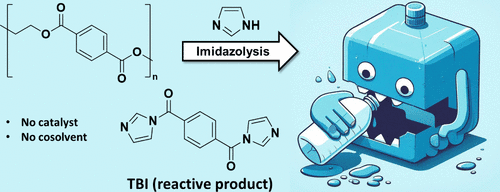Recently, a group of researchers at the University of Alabama stumbled upon a revolutionary way to recycle plastics.
This approach, which uses imidazolium to break down plastics, improves on traditional recycling processes and has the potential to produce higher quality recycled materials. This discovery holds great promise for recycling PET and polyurethane.
Imidazole (imidazole) is a polar compound, it can dissolve many organic and inorganic compounds. It is often used as a solvent in organic synthesis reactions; in the modification of materials, imidazole can also be used as an additive; imidazole ring is also an important structural unit of many drug molecules.
While experimenting with compounds that break down polyethylene terephthalate (PET), the team inadvertently discovered that imidazole, a versatile industrial compound, could effectively break down PET into valuable molecular components.

Recalling the moment of discovery, the project's lead researcher, Professor Jason Barra, said, “My students came back to the lab and said, ‘Oh, the plastic's gone, it's all gone.’” The team had been testing a variety of compounds to see what could break down PET, but imidazole exceeded all expectations and led to a groundbreaking breakthrough in recycling technology.
Current methods for recycling PET have limitations, usually involving mechanical or chemical processes, resulting in lower quality recycled plastics and fewer reuse applications. These traditional recycling methods rely on amines, which are less efficient and produce compounds with limited applications. However, imidazole not only efficiently breaks down PET, but also generates reusable molecular components that can be used in a variety of industries, greatly enhancing the potential for recycling.
While PET is one of the most common types of plastic, the implications of this discovery extend beyond PET plastic bottles. The team found that imidazole is also very effective at breaking down polyurethane (PU), another plastic widely used in furniture, insulation, packaging materials, and more. This is of particular concern because biodegradable PUs are still being developed, and the large amount of existing PUs is having a major impact on the global plastic waste crisis. The ability to break down polyurethane into reusable components is expected to significantly reduce the environmental burden associated with this durable plastic.
“This could have a much bigger impact than just recycling PET,” Prof. Barra emphasized, ”Being able to effectively break down polyurethane into reusable components could be a major change factor in our campaign to curb plastic waste. This technology could solve one of the most persistent challenges in plastic recycling.”
The University of Alabama is currently in the process of patenting this innovative method, which could have far-reaching implications for the global recycling industry. This serendipitous discovery underscores the value of curiosity-driven research, where unexpected breakthroughs can lead to revolutionary innovations.

